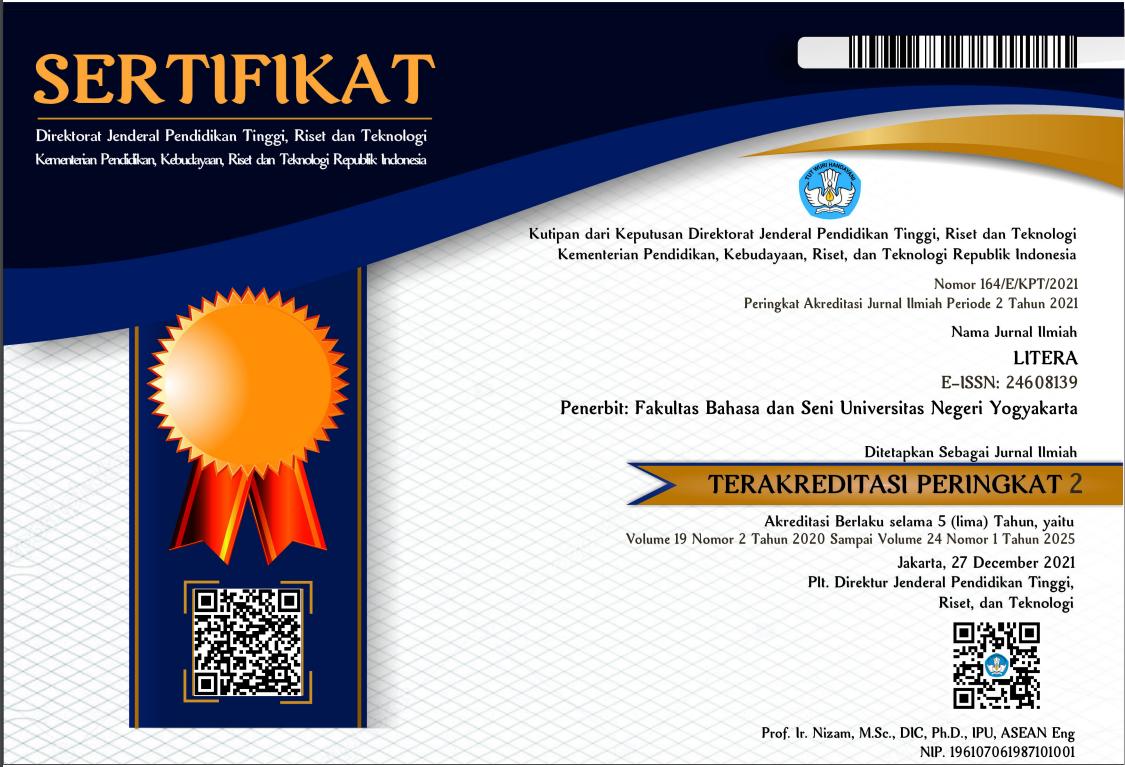FUNGSI PEMARKAH WACANA: SEBUAH KASUS DI KELAS BERBICARA PADA LEVEL UNIVERSITAS
Downloads
Penelitian ini menginvestigasi fungsi pemarkah wacana dan pengetahuan mahasiswa mengenai pemarkah tersebut. Penelitian ini adalah penelitian kualitatif. Data dikumpulkan melalui video-recording dan transkripsi. Analisis data menggunakan teori Brinton dan Alami. Penelitian ini menemukan seluruh jenis fungsi tekstual, yaitu sequence, repair, opening and closing frame markers, filler, information indicator, topic switcher, dan turn taker. Namun, fungsi interpersonal jarang ditemukan karena pembicara hanya berfokus pada penyampaian materi. Lebih jauh dapat dikatakan bahwa pembicara memiliki keterbatasan pengetahuan mengenai pemarkah wacana sehingga kerap menggunakan pemarkah yang sama. Oleh karena itu, penelitian ini menyarankan dosen untuk memperhatikan masalah ini dan menjadikan ini sebagai salah satu butir dalam penilaian.
Kata Kunci: pemarkah wacana, fungsi tekstual dan interpersonal
FUNCTIONS OF DISCOURSE MARKERS: A CASE STUDY OF A SPEAKING CLASS AT TERTIARY EDUCATION
Abstract
This study aimed to investigate functions of and students' familiarity with discourse markers. This was a qualitative study. The data were collected through video-recording and transcription. The data analysis used Brinton's and Alami's theories. The study revealed all textual functions, i.e.: sequence, repair, opening and closing frame markers, filler, information indicator, topic switcher, and turn taker. The interpersonal function was almost never found because the speaker only focused on delivering materials. Further, it was noted that the speaker had limited knowledge of discourse markers so that the same discourse markers were often used. The study thus suggested the lecturer should take these into account in the assessment.
Keywords: discourse markers, textual and interpersonal functions
Downloads
Aijmer, Karin (1996). Conversational Rou tines in English. Convention and Creati vity. London: Longman.
Aijmer, Karin (2002). English Discourse Particles. Evidence from a Corpus [Stu dies in Corpus Linguistics]. Amster dam: John Benjamins.
Alami, Mazineh. (2015). Pragmatic Func tion of Discourse Markers: A Review of Related Literature. International Jour nal on Studies in English language and Literature (IJSELL) vol. 3.
Asik, Asuman and Cephe, Pasa Tevfik. (2013). Discourse Markers and Spo ken English: Nonnative Use in the Turkish EFL Setting. English Langu age Teaching, Vol. 6, No. 12. 2013.
Asik, Asuman and Cephe, Brinton, L. (1996). Pragmatic Markers in English: Grammaticalization and Discourse Func tions. Berling and New York: Mouto de Gruyter.
Castro, Claudia Marcela Chapetón. (2009). The Use and Functions of Discourse Markers in EFL Classroom Interac tion. Profile, No. 11, Bogota Jan/Apr, 2009.Chaudron, C. & J.C. Richards. (1986). The Effect of Discourse Markers on the Comprehension of Presentation s. Applied Linguistics 7/2: 133-127.Croker, Robert A. (2009). An Introduction to Qualitative Research. Heigham, Juanita & Croker, Robert A. (eds.) in Qualitative Research in Applied Linguis tics: A Practical Introduction. London: Palgrave Mcmillan.
Fortune, Begona Belles. (2006). Discourse Markers within the University Presenta tion Genre: A Contrastive study between Spanish and North-American Presenta tion. Humanities and Social Sciences Faculty: Universitat Jaume.
Fraser, B. (1996). Pragmatic Markers. Prag matics. 6(2), 167-190.
Fung, L., & Carter, R. (2007). Discourse Markers and Spoken English: Native and Learner Use in Pedagogic Set tings. Applied Linguistics, 28(3), 410-439.
Halliday, M. A. K., & Hasan, R. (1976). Cohesion in English. London: Longman.
Hellermann, J., & Vergun, A. (2007). La nguage which is not taught: The Dis course Marker Use of Beginning Adult Learners of English. Journal of Pragmatics, 39(1), 157-179.
Ismail, Hind M. (2014). Discourse Markers in Political Speeches: Forms and Functions. JJ. of College of Education for Women, University of Anbar Vol 23.
Jonsson, Helena. (2013). The Use of the Discourse Markers Kind of and Sort of in London Teenage Conversation. LUND University.
Jucker, Andreas H. and Yael Ziv. (1998). Discourse markers: introduction. Discourse markers: descriptions and theory. Philadelphia: Benjamins.
Lam, P. W. Y. (2009). Discourse Particles in Corpus Data and Textbooks: the Case of Well. Applied Linguistics, 31(2), 260-281.Litosseliti, lia. (2010). Research Methods in Linguistics. Continuum International Publishing Group, London, United Kingdom.
McCarthy, M., & Carter, R. (1998). Spoken grammar: What is it and how can we teach it? English Language Teaching Jour nal, 49(3), 207-218.
Meyerhoff, Miriam. (2012). Discourse Analysis. London: An Imprint of Bloomsburry Publishing Plc.
Mí¼ller, Simone. (2004). Well You Know That Type of Person: Functions of Well in the Speech of American and German Students. Journal of Pragmatics, 36(1), 1157-1182.
Muller, Simone. (2005). Discourse Markers in Native and Non-native English discourse. John Benjamin's publishing company, Amsterdam/Philadelphia.
Muti'ah, Zahra. (2015). Gender and Discourse a Study of Teacher Discourse in EFL Classroom. STBA Teknokrat, Lampung.
Nejadansari, Darius and Muhammadi Ali Mohammad. (2015). The Frequencies and Functions of Discourse Markers in the Iranian University EFL Classroom Disocurse. International Journal of Research Studies in Language Learn ing Vol. 4.
Ogoanah, Felix Nwabeze and Dele Samuael Adeyanju. (2013). The Contextual Impli cations of "Like" and "As In" as Prag matic Markers in Nigerian English Usage. Journal of the Nigeria English Stu dies Association (JNESA) 16:1.
Rido, Akhyar. (2010). The Use of Discourse Markers as an Interactive Feature in Sci ence Presentation Discourse in L2 Setting. TEFLIN Journal, Volume 21, Number 1.
Rose, K. R., & Kasper, G. (Eds.) (2001). Pragmatics and Language Teaching. Cambridge, NY: Cambridge University Press.
Sharndama, Emmanuel C. and Samaila Yakubu. (2013). An Analysis of Discourse Markers in Academic Report Writing Pedagogical Implications. Department of English and Literary Study, Taraba State of Nigeria.
Schiffrin, D. (1987). Discourse Markers. Cambridge: Cambridge University Press.
Swan, Michael. (2005). Practical English Usage. Oxford: Oxford University Press.
Trillo, J. R. (2002). The pragmatic fossilization of discourse markers in non-native speakers of English. Journal of Pragmatics, 34(6), 769-784.
Weinert, R. (1998). Discourse organisation in the spoken language of L2 learners of German. Linguistische Berichte, 176, 459-488.
William, Nicholas. (2011). Research Methods the Basic. New York: Routledge.
























